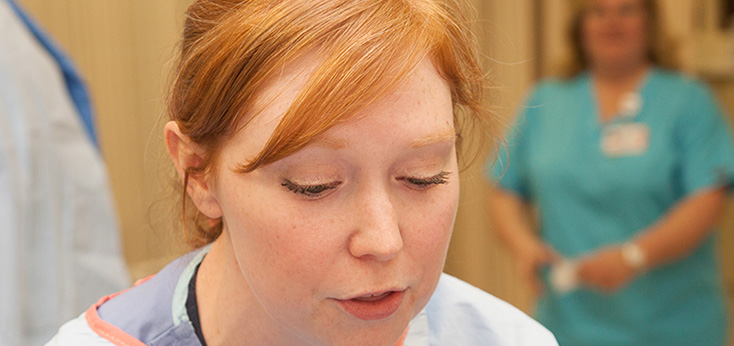Maternal Fetal Medicine Fellowship
MFM Research Resources
The MFM division at the University of Tennessee Health Science Center College of Medicine, Knoxville (UTHSC COM-Knoxville) has exceptional research resources and a large team to support the multiple studies conducted by faculty and fellows.
Fellows are expected to complete a thesis project during their training that is of quality to satisfy the ABOG requirement for subspecialty board certification in Maternal-Fetal Medicine. Dedicated blocks of research time and statistical support are provided. The fellowship is designed to support 12 dedicated months set aside for research endeavors, with an option of extension of 17 months with elective blocks. Research block time is planned individually based on the type of interest and maturity of the research plan. During that time, and with the input and mentorship of the research director, trainees are expected to select a thesis focus and committee.
Mentorship of fellows in research is a priority in our division. While all fellows are supported to ensure that they successfully complete a high-quality thesis study, they are also included in multiple projects and publications. Opportunities also exist to collaborate with other internal or external researchers. Fellows are also encouraged to participate in other research endeavors and to disseminate their research findings at meetings or conferences.
Quality Improvement
Quality Improvement (QI) and Process Implementation (PI) projects in the Department of Obstetrics & Gynecology are performed in close collaboration with the Quality and Service Implementation Department Manager, Megan Lacy Young, and Quality Improvement Data Nurse, Brittany Bohrer, in the Center for Women & Infants. Using existing practice standards and recommendations, this duo assists clinical staff in assessing internal processes and outcomes related to Maternal Morbidity and Mortality. Specific current areas of focus include:
- Incorporating trauma-informed care
- Decreasing postpartum hemorrhage
- Decreasing primary cesarean delivery among nulliparous, term, singleton, and vertex pregnancies
- Improving recognition and response to postpartum hypertension
- Increasing recognition and response to perinatal anxiety and mood disorders throughout pregnancy and postpartum (including among NICU parents)
- Fostering relationships with Doulas through our Doula Collaboration Program to improve the patient experience
- Ensuring access to comprehensive contraception, including immediate postpartum long-acting reversible contraception and permanent contraception during delivery admission
- Increasing screening for cardiac conditions of pregnancy
- Multi-disciplinary review of major complications
- Decreasing hypoxic-ischemic encephalopathy
While all of these projects stem from institutional passions, some involve partnerships with state and national collaborations including the Tennessee Initiative for Perinatal Quality Care (TIPQC). Using the QI lens, presentation and publication opportunities are ever-growing and supported by Megan.
In addition to robust QI activity, the Quality and Service Implementation Department has added two new staff under awarded service grants. After the Center for Women and Infants was awarded Opioid Abatement funding, Samantha Parker joined as the Opioid Abatement Data Specialist. This grant is focused on creating wrap-around services for pregnant women with a history of or current substance use and their newborns. Samantha is responsible for collecting maternal and newborn data across the perinatal experience to measure the impact this grant work has on the outcomes of mothers and babies. Samantha and Megan will work with the Opioid Abatement grant team to help investigate and implement strategies to further improve outcomes for this special population through a trauma-informed lens. In addition to this, the Department will support a Perinatal Telehealth grant awarded to the High-Risk Obstetrical Consultants practice. This grant will focus on expanding access to telehealth services to address a rapidly growing population of patients who require high-risk obstetrical services due to dramatic increases in morbidity in the face of increased barriers to accessing healthcare. Destiny Harris will be joining the Department to track and evaluate the impact of this grant. Destiny and Megan will be working with the grant team to identify opportunities, needs, and growth patterns. Future potential for scholarly activity from the work of these grants will be plentiful.
Physical Activity and Metabolism (PAM) Laboratory
The PAM Lab, housed within the Department of Obstetrics and Gynecology, operations are overseen by Jill M. Maples, PhD, Associate Professor, opened in February 2022. Made up of office and lab space that is equipped for clinical and translational physiological research that is specifically designed to assess whole-body human metabolism under a variety of conditions across multiple patient populations.
The broad mission of the Physical Activity and Metabolism Research Laboratory is to improve the lives of women and infants in East Tennessee, and beyond, through scientific investigation and research. Learn more about the PAM Laboratory.
Scholarly Activity
Top

Medical Simulation
Simulation is the imitation of real-life experience including the use of task and virtual reality trainers, as well as standardized patients to refine technical and clinical skills of healthcare professionals. At the UT Center for Advanced Medical Simulation, the goal is continual improvement in quality of patient care and safety through education, practice, and assessment. Simulation can replicate almost any diagnostic or therapeutic situation, from simple IV insertions using low-fidelity task technology to complicated surgeries using high-fidelity, computerized manikins or virtual reality modules.
